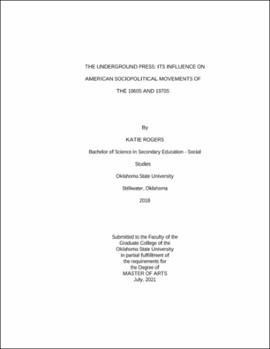| dc.description.abstract | This thesis examines the underground press in the United States during the late 1960s and early 1970s. Through close analysis of the more popular underground newspapers from this time period and from different geographical regions of the United States, this thesis shows how the underground press helped aid in awareness for different sociopolitical movements as well as helped organize and gain support for these movements. This thesis focuses on three sociopolitical movements and their relationship with the underground press. These three movements are the Red Power Movement, the Women's Liberation Movement, and the Gay Liberation Movement. Inspired by the politics of the 1960s, papers like the Berkeley Barb, East Village Other, Great Speckled Bird, and The Rag challenged mainstream ideas about these three movements and many others. Unlike the mainstream press, which tended to prioritize objectivity and profits, the underground press prioritized empathy and political activism. The underground press gave the youths of America participating in these movements an opportunity to report their news the way they wanted it to be reported. The mainstream media at the time did not give these three sociopolitical movements the attention and sympathy these groups felt they deserved. The mainstream media, in many cases, showed either an unconscious or direct bias against these movements. As a result of the mainstream media's bias against and/or apathy towards these movements, and others, hundreds of underground newspapers formed across the United States in the matter of a couple of a years. They made it their mission to inform their readers of these movements and the plights of minority and oppressed groups and asked for the direct involvement of their readers to help these people. They were also many of these sociopolitical movement's primary means of organization for protests, demonstrations, and meetings. The underground press helped these movements spread awareness, gain allies, and support (physical, monetary, and political) which in turn helped these movements make long-term changes to American society and American attitudes. | |
